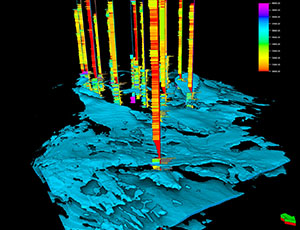Course Details
Home / Public Courses / Course Details
Seismic Acquisition and Processing - From Basics to Modern Concepts (GPH07)
Description
The acquisition and processing of seismic data is indispensable for any successful exploration and production project. It is essential to know what additional information a newly acquired or re-processed vintage seismic dataset can deliver to the interpreter or reservoir engineer. Nevertheless, many users of seismic data are unfamiliar with seismic design principles and data processing. Moreover various technological developments in recent years have led to complex and sometimes confusing terminology.
This course is intended to give you a sound understanding of the essentials of seismic acquisition and processing and shows how this understanding can help you in your day-to-day work.
Course Level: Foundation / Skill
Duration: 5 days
Instructor: Christian Stotter
This course is intended to give you a sound understanding of the essentials of seismic acquisition and processing and shows how this understanding can help you in your day-to-day work.
Course Level: Foundation / Skill
Duration: 5 days
Instructor: Christian Stotter

Designed for you, if you are...
- A geologist, geophysicist or petroleum engineer, who uses seismic data in daily work and who wants to know about the potential and limitations of seismic data depending on the used acquisition parameters and processing workflows
- A geoscientist or manager involved in seismic acquisition and processing projects, as the acquired knowledge will help you in the tender process and operational phase of seismic acquisition and processing projects
How we build your confidence
- Determination of basic seismic acquisition parameters using wave propagation principles and existing data will give attendees practical understanding of land and marine survey design
- The effects of changing key survey parameters will be shown on real data and case studies
- Basic processing concepts will be derived intuitively from signal processing and wave propagation principles
- Attendees will get hands-on experience in seismic data processing on real data examples and state of the art seismic processing software
- Benefits and pitfalls of modern imaging algorithms will be shown on case studies from different geologic environments
- In a seismic tender exercise participants will define acquisition and processing parameters based on principles they have learned during the course
The benefits from attending
At the end of the course you will have a good understanding of the possibilities but also pitfalls and limitations of seismic data acquisition and processing projects. With that foundation you will feel confident to:- Evaluate basic survey parameters for seismic acquisition
- Judge the relative importance of seismic acquisition parameters for specific geologic targets
- Distinguish between different seismic acquisition proposals based on provided survey parameters
- Perform basic QC and parameter evaluation for seismic processing projects
- Evaluate a processing sequence for seismic data processing tenders
- Better interact with experts in the fields of seismic acquisition and processing
- Assure optimal use of financial resources
Topics
- Overview and introduction
- Elementary theoretical concepts
- Seismic wave propagation, reflection and transmission
- Approximate concepts: acoustic waves, rays and the convolutional model - Sampling and aliasing components of seismic acquisition projects
- Target oriented seismic survey design - 2D and 3D surveys
- Source and receiver parameters and configurations
- Seismic acquisition timeline - from design to operations
- Signal processing fundamentals
- Pre-processing
- Seismic-navigation merge
- De-signature, zero phasing
- Noise removal - swell and de-spike
- Gain recovery
- Deconvolution
- Multiple removal - SRME
- Data regularisation and interpolation
- Velocity analysis, NMO and stack - Pre-stack time migration
- Post-processing
- Depth imaging and tomography
- Novel acquisition and processing methods
- Wide azimuth survey geometries
- Simultaneous source acquisition
- COV processing
- Three components - aspects of ocean bottom processing
- Full wave form inversion concepts
© All rights reserved
HOT Engineering GmbH Tel: +43 3842 43 0 53-0 Fax +43 3842 43 0 53-1 hot@hoteng.com
